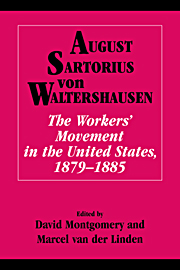Book contents
- Front Matter
- Contents
- Acknowledgments
- 1 Introduction
- 2 August Sartorius von Waltershausen (1852–1938), German Political Economy, and American Labor
- 3 The Trade Unions in the United States of America
- 4 Boycotts: A New Trade Union Weapon in the United States
- 5 Relief Funds in the United States
- 6 Bibliography of Sartorius von Waltershausen's Writings
- Index
5 - Relief Funds in the United States
Published online by Cambridge University Press: 22 September 2009
- Front Matter
- Contents
- Acknowledgments
- 1 Introduction
- 2 August Sartorius von Waltershausen (1852–1938), German Political Economy, and American Labor
- 3 The Trade Unions in the United States of America
- 4 Boycotts: A New Trade Union Weapon in the United States
- 5 Relief Funds in the United States
- 6 Bibliography of Sartorius von Waltershausen's Writings
- Index
Summary
At the start of the article on trade unions I pointed out that the United States has a large number of welfare associations based on mutuality. I attributed their prominent position, and that of private associations in general, essentially to the country's circumstances. These organizations provide help to individuals confronted with overwhelming natural forces and are also involved in many aspects of social life which in densely populated countries have rightly been taken on by the state and local authorities. A distinction should be made here between the settled and the recently developed areas. For the more one moves to the latter, the more the above applies. In the West even criminal justice is often exercised through a private agreement among the settlers, who, it must be said, are greatly troubled by robbers and tramps. In the East assistance to the poor is also largely dispensed by private charities, but public welfare provision, in particular schemes organized by local councils, is spreading gradually.
American people make quite a different moral judgment of poverty than we Europeans. It is no exaggeration to say that the average educated American cannot stand the poor as such. That is not to say that heartlessness is an inherent part of the American national character. Rather, this loathing is explained by the fact that the concept of work is held in higher regard than in Europe, something which I have highlighted on several occasions as a particularly appealing trait of this vigorous nation.
- Type
- Chapter
- Information
- The Workers' Movement in the United States, 1879–1885 , pp. 171 - 229Publisher: Cambridge University PressPrint publication year: 1998

